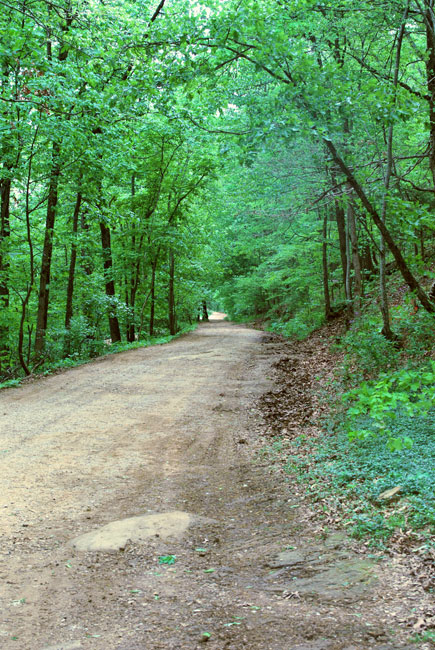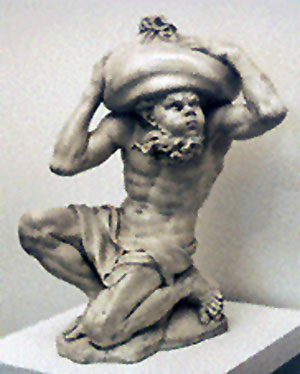
Today it was a peaceful stroll; tonight it’s a wind tunnel.
The wind is rushing around outside like — well, think of your favorite simile: the ocean; a herd of buffalo; a horde of flying monkeys.
Many of the trees around here are almost fully leafed out, so tonight they’re all tuned up for the wind to play; meanwhile the dying hackberry tree (badly burned two years ago) at the eastern end of the cabin is groaning and creaking like an arthritic ogre, adding to the ruckus. Twice tonight I’ve heard what I thought sounded like a freight train and panicked, trying to figure out how to lure Rusty and Sebastian into the basement before it was too late, only to realize that it really wasa freight train, carrying a load of gravel through the tunnel that runs for about a quarter-mile under this mountain.
I’ve lived much of my life on the fringes of the wind: in Alabama the tornadoes almost always happened to the west or south; in Florida, the hurricanes usually scraped past us; in Texas, we were always a few miles away from the bad spots. The big winds here in Winslow usually seem to come from the south, but veer away or break up into just a lot of sound and fury once they hit the Ozark foothills.
And for this I am grateful.
Some of my earliest coherent memories of my father date back to the mid-sixties, when he had just returned from a tour in Vietnam. Every time a summer storm blew up during the night, he would get out of bed, anxious and clumsy, and turn on lights all through the house, eventually settling in the living room, parked there on the laz-e-boy until the sun came up, a performance that I always found very disturbing. I learned later that during his childhood his family home had been leveled by a midnight windstorm; on top of that the time spent overseas had probably not made his sleep any more comfortable.
As for me, I don’t mind the wind so much. Rain is my personal nemesis: if rain begins to fall during the night I invariably awaken, and will find myself unable to sleep until it stops. The wind is air, the air I breathe, the medium of hearing: rain is water, fine in its place, but unpredictable and unreliable; essential to life, but never a friend.
*
In the time of Homer — the Greek poet, not Bart’s dad — the four winds were called the Anemoi, children of Atraeus, a star god, and Eos, the goddess of the dawn, and were commanded by Aeolus, the Keeper of the Winds, a demigod who lived on a floating island in the Mediterranean Sea. (The Greeks drank wine with pine sap in it, which may explain a lot of this.)

Boreas, the north wind. The thing on his head is supposed to be a seashell. Your guess is as good as mine.
As they did with most natural phenomena, the Greek storytellers gave the winds distinct personalities:
- The north wind was Boreas, violent and impulsive; he occasionally took the form of a horse, and was supposed to have fathered twelve colts by mares belonging to the King of Troy. According to legend, they could run across a field without even crushing the grass.
- The south wind was Notus, whose hot, dry breath destroyed crops in late summer, and brought both droughts and summer storms.
- The west wind was Zephyrus, the harbinger of spring. The flower we call the hyacinth was said to have been created by Apollo when Zephyrus, in a jealous fit, caused the death of a boy named Hyacinthus with whom both gods had become infatuated. In Greece the hyacinth is one of the earliest flowers to bloom in spring, and its appearance often coincides with the arrival of steady western breezes.
- The east wind was Eurus, which brought rain, but was otherwise considered bad luck. The classical Greeks only recognized three seasons: winter, spring into summer, then summer into fall, which were associated with Boreas, Zephyrus, and Notus, respectively. Eurus had no season, and there are no stories associated with him.
Here in northwest Arkansas, the setup is a little different than in the eastern Med: we get winds from the north in winter, and the south most of the rest of the time, except for nights like tonight, when they both seem to be running at once. No gentle breezes herald the spring here, but gusts and turmoil, tearing the new leaves off the trees and flattening the daisies and irises blooming on the roadsides.
In the morning I’ll find bits of vegetation scattered everywhere, along with a few dead branches brought down from the old oak tree out front. A flowerpot will have overturned on the front steps, and the dog’s food bowl will have blown over from the neighbor’s yard.
Most agricultural societies have traditionally placed the beginning of the new year in spring, at the time of seasonal flooding, or rainstorms, or other vigorous manifestations of change. Living here, especially tonight, I can understand that feeling that the new year is only now breaking out of its shell.
In a place like this, spring doesn’t arrive — it’s born, kicking and squalling all the way.
* * *
Leave a Reply